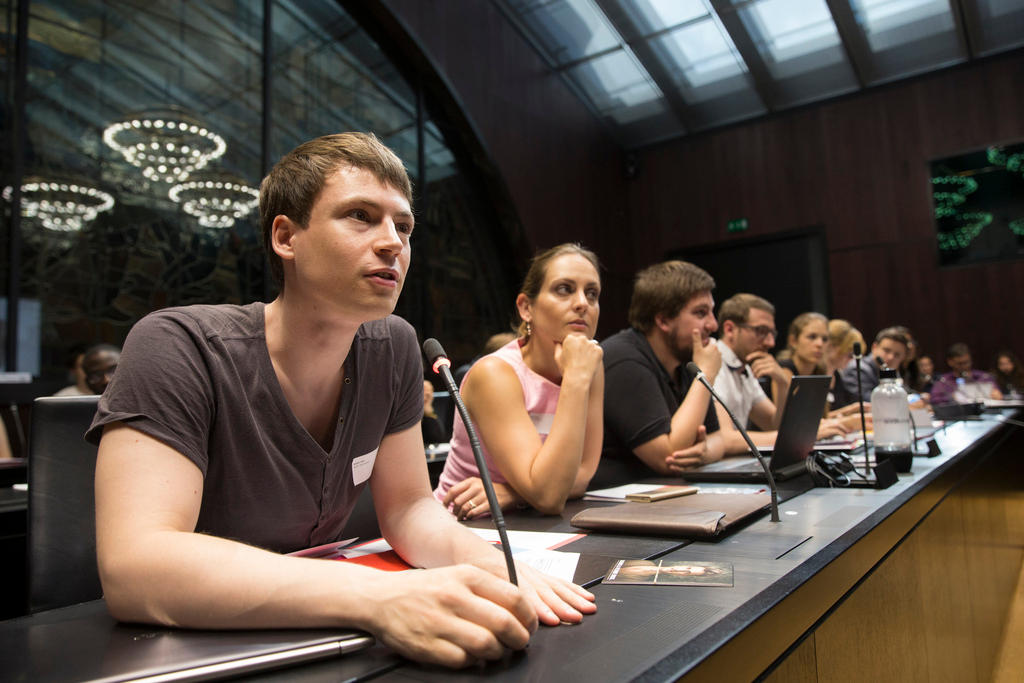Are Swiss judges on a tight political leash?

In some countries, judges are not allowed to be members of political parties. Not the case in Switzerland, however, where party membership is in practice a prerequisite. Elected judges even pay a part of their income to their affiliated party.
Imagine you were in court on charges of, say, possessing cannabis. Would you rather be sentenced by a judge from the right-wing Swiss People’s Party, which opposes the legalisation of cannabis, or by a judge from the Green Party, which is in favour of lifting the ban?
In Switzerland, this is not just a theoretical thought exercise. Almost all judges are members of a party. The idea behind this is that different opinions should democratically influence the interpretation of the law. The democratic ideal is given priority over justice for the individual, or, to put it another way, you are out of luck if you smoke dope and encounter a judge from the SVP, or evade taxes and face a Social Democrat.
Membership obliged
There is no specific training for judges in Switzerland. Usually (but not necessarily) aspiring judges study law, then become lawyers or work in a court – and keep an eye out to see which party will have a judge’s seat available in the near future.
Electing judges in Switzerland
Judges are elected by parliament in Switzerland. In some cantons, the electorate also votes.
The legal requirement to stand for election is usually just citizenship, not necessarily a legal education – and many cantons appoint lay judges alongside career judges.
The term of office is relatively short (usually four or six years). After that, judges must stand for re-election.
Without party membership, you have almost no chance of being elected to the bench. The posts are generally distributed according to a formula based on the proportion of votes won by each party. In concrete terms, anyone who wants to become a judge must join a party.
When a party has decided on its candidates, a secret ballot usually takes place. Here, both sides profit. On one hand, the aspiring judge doesn’t have to conduct an election campaign. And on the other, the party gets some money – the so-called mandate tax, unique to Switzerland, paid by the judge to the party after the vote.
For the political parties, these contributions by judges are an important source of revenue. Not all parties publish the figures, but the contributions are often five-figure sums. The People’s Party, at least, is transparent: the mandate tax for federal-level judges is equivalent to 2% of the group’s income.
Judging on party lines?
If judges are members of political parties, the question of whether or not they are independent is unavoidable. For example, a 2016 study by the Tages-Anzeiger newspaper showed that conservative judges reject complaints by asylum-seekers as much as three times more frequently than other judges.
Regina Kiener, a professor of law and expert in judicial independence at the University of Zurich, says that everyone has a world-view. “It doesn’t make a fundamental difference whether that world-view is expressed through membership of a party or not,” she says.
Party membership is an external acknowledgement of that world-view, which can even serve judicial independence. But, she says, “party affiliation is problematic in terms of the central role it accords to political parties in the selection, election and re-election of judges.”

More
No Swiss state funding for political parties? Not so fast.
Unlike in other countries, judges in Switzerland have to stand for re-election after a relatively short period in office. After controversial judgments, some lawmakers have indeed threatened certain judges with not being re-elected.
A corrupt voting system?
In a reportExternal link earlier this year, the Council of Europe’s Group of States Against Corruption (GRECO) severely criticised the Swiss judicial electoral system. Quality and objectivity must play a bigger role in the recruitment of judges, Greco said. In other words, a person’s competence and qualifications should be decisive, not his or her party membership.
According to GRECO, Switzerland should also ensure that judges’ decisions are not used as grounds for not re-electing them. The re-election process should either be revised or completely abolished, it said.
GRECO was particularly critical about the payments Swiss judges make to their parties. “After the election, the relationship to political forces must be capped – therefore, the practice by which federal judges pay a part of their salary to the party must be stopped,” it wrote.
Professor Kiener would also prefer the mandate tax to be abolished. “This connection between the judiciary elections and party finances is incompatible with the rule of law,” she said.
Transparency initiative targets murky party funding
Swiss political parties are not obliged to account for their financing. Switzerland is frequently criticised abroad for this lack of transparency. Often cited are the reports of Transparency International and GRECO, the Group of States Against Corruption at the Council of Europe.
Thanks to direct democracy, however, things are now moving. Late October, a cross-party committee handed in the popular initiative “For more transparency in political funding”. According to the initiative, parties and committees should disclose their budgets and must declare the origin of any donation over CHF10,000 ($10,000).
translated from German, swissinfo.ch

In compliance with the JTI standards
More: SWI swissinfo.ch certified by the Journalism Trust Initiative












You can find an overview of ongoing debates with our journalists here . Please join us!
If you want to start a conversation about a topic raised in this article or want to report factual errors, email us at english@swissinfo.ch.